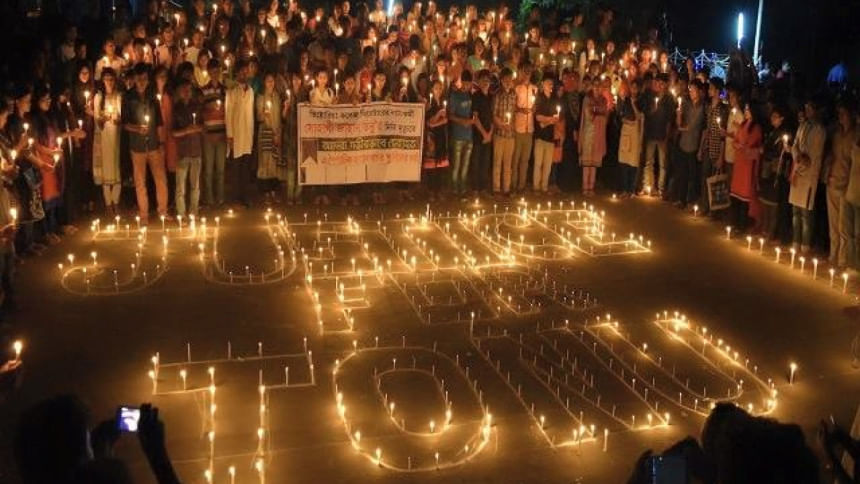Can justice ever be done to Tonu?

Justice for Tonu has taken social media by storm after the body of 19-year-old Tonu was recovered from Mainamati Cantonment area in Comilla on the night of March 20th. The second year student of History at Victoria College was brutally raped and then murdered. Amidst countrywide protests in social media and the streets demanding justice for Tonu, the army authorities have stated that they "are extending all out support to the police administration" with the investigation.
Given the way things go in Bangladesh, especially in light of the public outcry, or perhaps because of it, murder suspects will probably be found quickly, and taken into remand, then eventually confirmed as the culprits, even in the absence of any forensic evidence. Even though Bangladesh has introduced scientific criminal investigations under CID (which provides forensic support to other law enforcement agencies) the country is ill-equipped and lacks the basic infrastructure to instill a methodical criminalistics approach to solving gruesome crimes. The lack of forensic experts and technology and an overwhelming number of untrained field officers, to many of whom the very concept of forensic science remains alien, sheds considerable doubt on the way such violent crimes are "solved".
But forget forensic science. Do we even have the basics covered? Weren't there law enforcing agents who happened to be standing nearby when Avijit Roy was hacked to death after which the killers fled in plain sight? And that time when a large group of women were molested for over an hour by hordes of men during Pahela Baishakh celebrations while the police were on duty? In this case, Tonu's dead body was found in the bushes in a high security area. One may think that the civic duty of law enforcers lies not only in solving crimes, but more importantly, in preventing them in the first place. But that's evidently not how it works here in Bangladesh. The point is, don't be surprised if the police happen to identify and charge the suspects for Tonu's murder in the coming days (a process which takes ample time even in developed nations), and even more so, if the public don't question as to whether or not they really are the actual culprits because somehow they always readily confess in police custody.
So as long as the protests die down, the outraged masses are pacified, and we go back to being the nation reeling in the progress of our national development blind to socio-economic and political woes, who cares, really? We are the country that gleefully brands India the "rape nation", and no matter the countless number of girls and women who lose their lives to acts of sexual violence on our soil, the over-zealous nationalist in us echoes the sentiment, "At least we're better than India!" It is not uncommon to come across comments such as "Are we turning into India?!" on news posts of sex crimes on social media. If you believe otherwise, and retort with a comment thinking that comparison with India is ludicrous and unnecessary because crimes against women in Bangladesh have always been commonplace, you may be accused of being anti-national. Because in Bangladesh, you are more likely to be called anti-national if you criticise the cricket team than if you question as to why more is not being done to protect our women and children. More girls than boys are enrolled in school; we have the world's first all-women UN peacekeeping unit; and our "glorious" RMG sector is thriving on the backbone of women. So it must be that instances of public mass molestation of women and rapes of children and women (a large number of which go unreported) are a tiny blot on the bigger success story that is our national developmental progress, right? Sadly, that's the kind of skewed narrative that seems is being pushed, especially since politicians will publicly gloat whenever we've struck a foreign deal but largely keep mum on issues closer to home, such as crimes against ordinary citizens.
With regard to the latest crime to have garnered national attention that is the heinous killing of Tonu, her alleged killers, once caught, will perhaps be sentenced to death in a couple of months or so. We may never know the details of the criminal investigation, what hard evidence incriminates the suspects, and whether or not the real killers are roaming free, but in the minds of the masses, "justice" will have been served. In a broader sense, however, is justice really ever as simple as that? As elusive as justice is, can it be achieved simply by sending Tonu's killers to the gallows? Just as the causes of injustice are deep-rooted and systemic, so must be the evolution of justice.
Tonu's death is a result of the lawless society we continue to nurture -- unaccountable law enforcers, a legal system that has many loopholes and rapists and murderers effortlessly evading the eyes of those who were meant to protect and serve. As we unitedly demand justice for Tonu, we ought to remember that that entails working towards a society where no one meets Tonu's fate and that of all those whose lives were snatched away as a result of violent crimes. And so, we need to ask ourselves, does justice for Tonu end at capturing and punishing her perpetrators, or does it merely begin?
The writer is a freelance journalist.

 For all latest news, follow The Daily Star's Google News channel.
For all latest news, follow The Daily Star's Google News channel. 



Comments